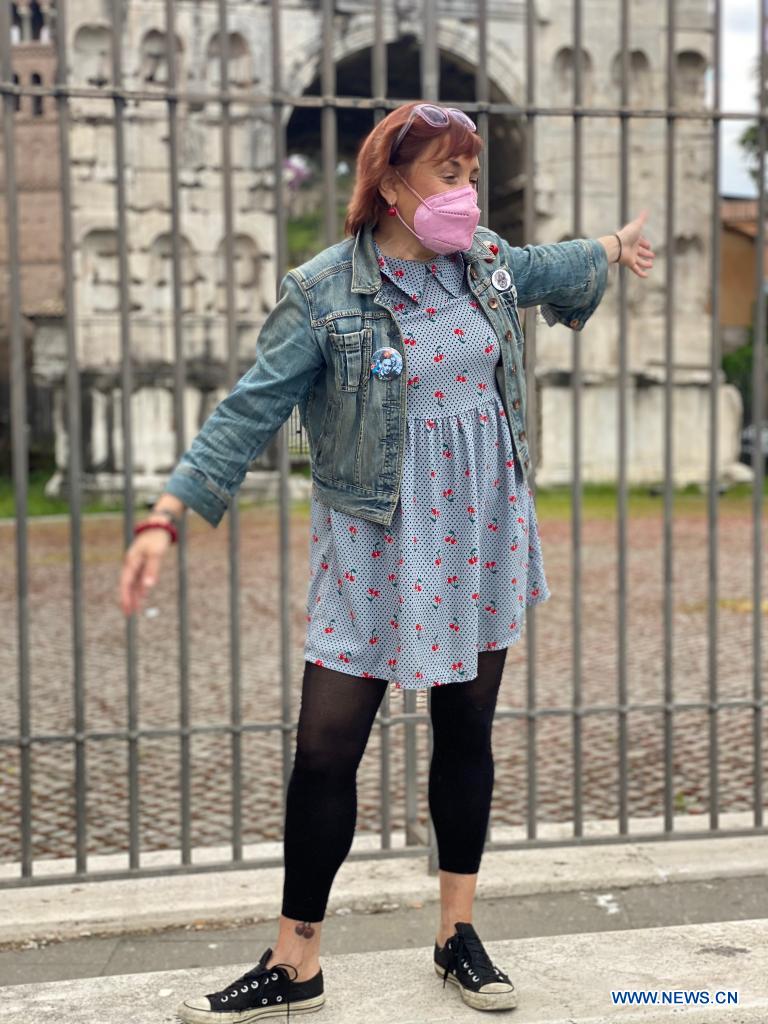
Comedian Marsha De Salvatore poses for a photo in Rome, Italy, on April 5, 2021. De Salvatore has comedy acts in both Italian and English, and she's the director of the Rome Comedy Club, which included monthly performances in English before the pandemic shut them down. (Str/Xinhua)
ROME, April 5 (Xinhua) -- Comedian Marsha De Salvatore figured out early on that the coronavirus pandemic would have a major impact on her craft.
"When the first lockdown came I got a few fellow comedians together and did some shows online," De Salvatore told Xinhua. "It did not go well. The feeling you get from being in a room full of people wasn't there. People watching could post comments but there was no real-time feedback. It just didn't work, so we quit making them."
That means the 48-year-old De Salvatore, who would do three or sometimes four shows a month before the pandemic has all but stopped performing. A dual citizen from Italy and the United States, she used to supplement her comedy work by teaching English classes; now those classes (all online, of course) are her main source of income.
She has performed a handful of times since the pandemic began -- at an outdoor festival last summer, for example, and a private event a few weeks after that, then a fundraiser -- but without the normal rhythm of performances she said her timing was off. The performances were more of a struggle than they should have been.
"It's like a muscle: if you don't keep training it, it can't perform at the same level," she said. "It's the same thing for live performances."
De Salvatore has comedy acts in both Italian and English, and she's the director of the Rome Comedy Club, which included monthly performances in English before the pandemic shut them down. But she is probably best known for her Italian-language one-woman show where among other things she discusses a congenital health disorder that requires her to get blood transfusions every three weeks. In other words, she's used to finding humor in difficult situations. But she said the pandemic presents a unique challenge for a humorist.
"There's an old adage that states that 'The formula for comedy is tragedy plus time,' but how much time?" she asked. "This is a crazy situation because people are dying. Personally, I don't think it's too soon to look for the humor in what's happening but there aren't many outlets to try the jokes out."
De Salvatore's health problems have added an extra layer of concern to the pandemic. Because the hospital she used to visit for her transfusions became one of Rome's main hospitals for the coronavirus, she had to switch facilities.
Early on, there was a health scare because some of the nurses who treated her tested positive for COVID-19, the disease caused by the coronavirus. Luckily for her, she wasn't infected, and now, because her condition compromises her immune system, she's been fully vaccinated before most of her age-group peers. Still, she said, the pandemic and her health condition combined to cause her a great deal of anxiety.
"I'm fully vaccinated and so I'm safer than most people to go where I want to go and do what I want to do, but I still don't want to be in a room full of people," she said.
What does that mean for comedy after the pandemic? Most places that host comedy events -- including the place that hosted the Rome Comedy Club De Salvatore hosted -- are dark and crowded with locals.
"I don't think things are going to go back to the way they were in 2019, at least not right away," she said. "But when they do start, I think everything will be outdoors. I am sure people will feel a lot more comfortable in an outdoor space." Enditem